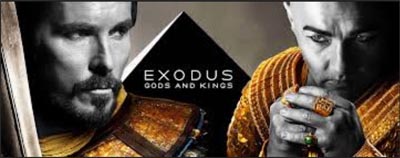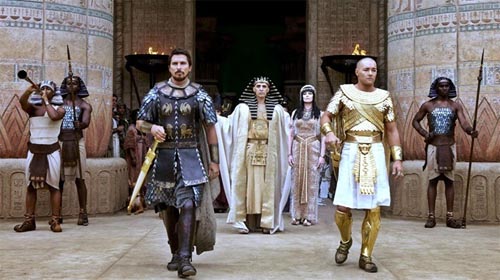There is no question that Hollywood knows how to make big, beautiful, epic, blockbuster movies with wide appeal. In that regard they are second to none. With the release of the recent Biblical themed movies – the latest of which is Exodus – Gods and Kings by Ridley Scott, the question for Christians is has Hollywood learned, or more appropriately, recalled how to do Biblical themed movies that Christians will both enjoy and approve of? I say ‘recalled’ because of course Hollywood used to know how to make such movies. Anyone who has seen Cecille B. DeMille’s Ten Commandments understands why it is regarded as the standard against which every other Biblical epic is judged. To answer the question: no, Hollywood has not learned or has chosen not to recall how to make movies Christians can both enjoy and approve of. If Exodus – Gods and Kings is the gauge, then it’s clear Hollywood remains clueless in this regard – or perhaps more appropriately – remains willfully antagonistic toward the Christian messages inherent in Biblical themed movies. This assessment stands in stark contrast to the article in Christianity Today For Ridley Scott, director of films such as Gladiator (2000), Hannibal (2001) and American Gangster (2007) the account of the exodus is just another story. He could not possibly care less if it is a Biblical story that has theological meanings, symbolism and message. He doesn’t care if it is cherished by Jews and Christians the world over. He’s a story teller, and he’s going to do it his way. And do it his way he did. After viewing the movie I sat down and wrote over 3 dozen inaccuracies and problems (from a Christian perspective) in the film without having to look hard or dig for them. What follows are what I consider to be 10 of the most egregious. After that I’ve included commentary on the ten reasons that Brett McCracken thinks it’s okay to see the film. Here are links to the two sections:
Part I. Ten Reasons to be Hardhearted toward Ridley Scott’s biblical epic
Solomon reigned from 970 – 930 BC. The fourth year would be 966. Go back 480 years, and you get 1446 BC – known as the “early date” of the exodus. Of course if you rely on the testimony of man over the testimony of scripture, you’ll go with the “late date.” So we know from the start that this production is not concerned with Biblical authority or Biblical accuracy. 2 No Concern for fidelity to the biblical account This telling takes “artistic license” to a new level. DeMille’s production also took artistic license – but they were more innocuous, and didn’t affect theology. For instance DeMille did a conflation of the punishment for the golden calf (Ex 32) with Korah’s rebellion (Num 16). Scott however directly changes significant events -casting a whole new light on the event. For instance, having Moses, who should be confronting Pharaoh, hide while families are dying because of him instead of seeking Pharaoh out as God told him. In fact this version has Moses leaving his family behind instead of bringing them along, as the Bible says:
Not to mention Moses’ great line that even Sunday school children can tell you with great drama: “Let me people go!” (The bible – Exodus 5.1) is notably absent in this version.
3. No concern for biblical themes – God’s work through people – God’s holiness (Ex 3.5) – In the Bible, God himself writes the first tablets with the 10 Commandments (Deut 5.22)
5. The Plagues miss the point Also in what appears to be an attempt to make the plagues believable to 21st century science oriented viewers, Scott has Pharaoh’s magician explain – in a manner worthy of one of the many such attempts by science to identify natural causes for the miracles of the plagues[3] – how each plague was a result of the first plague of the Nile turning to blood. In contrast, the Bible has the magicians trying to replicate the plagues, not explain them away. 6. The Distinction God Makes between His people the Israelites and the Egyptians is conspicuously missing
In Scott’s production, Moses asks God what he’s doing, the plagues are falling on Israelite and Egyptian alike. 7. Moses’ wife Zipporah was a heroine, not a distraction 8. No Recognition of the Devastation of the plagues
In DeMille’s version that recognition is made by Pharaoh’s advisors telling him:
No such recognition of the power of God, and humbling of Egypt is made in Scott’s version. 9. Moses works at cross purposes to God 10. Scott Ruined the Red Sea Crossing
In his 1956 production, DeMille used special effects that were amazing for the time, setting a high bar for the standard of depicting the wall of water on both sides with the Israelites crossing in the middle. Ever since then successive productions have played a game of one-upmanship trying to outdo DeMille’s wildly successive movie and depiction. So much so that this scene – until now – has been a highlight in every telling of the exodus. The 1998 animated feature The Prince of Egypt outdid DeMille by showing a whale (or huge fish) in silhouette very close to the wall of water when lightning flashed. The 2006 The Ten Commandments by Dornhelm outdid them both showing earthquakes, volcanoes, and schools of fish in a panic as the waters prepare to part. After they part you’re treated to a rich landscape with huge stone pillars reminiscent of the celestial Pillars of Creation – perhaps a reference to the same power God used during the creation week was now being used for this miracle. The 2007 animated The Ten Commandments by Boyce and Stronach did not try to compete with that, but did outdo the 1998 Prince of Egypt by showing entire schools of fish just inside the wall of water, and having a child poke his head into the standing wall of water. Against that backdrop of an exquisite history of presentations of the parting of the Red Sea I was expecting outstanding CGI representations of the wall of water for this presentation. But alas, as noted since Scott feels no compulsion to be accurate to the Biblical account, and apparently a wall of water is too miraculous for him to stomach, there is no parting of the red sea, no wall of water on both sides while the Israelites pass in between in his account. Instead you get – a tidal wave. Perhaps you’re supposed to believe it’s supernatural because it’s accompanied by numerous tornadoes. The tornadoes made the depiction more evocative of the scene from the X Men movie where Storm evades pursuing fighter jets by creating multiple tornadoes than it was of the miraculous powers of God. In other words, the tornadoes and tidal wave just didn’t do it for me. So there you have it. Clearly to Scott, it’s just another story – and he can tell it any way he wants. For Christians, we know it is more than just a story. If you want a retelling closer to the Biblical account, you’ll need to find a producer more respectful to the scriptures. Next up, McCracken’s reasons why “not to be hard hearted” with my interspersed comments regarding why his reasons are not sufficient enough for Christians who believe, as scripture says, that it is important to “Watch your life and doctrine closely.” 1 Tim 4.16
Part II: 1. The film is beautiful.
5. Fear not: God’s presence is also depicted as a burning bush. 6. The attention to period detail and the level of artisan craftsmanship in the film is exquisite
8. Though it would have benefited from a bit more quiet reflection and character development amidst the big-budget battles and CGI spectacle, on the whole Exodus has compelling characters and good acting. 9. Plot deviations and minutiae aside, key themes of the Exodus story are there 10. The film is personal to Ridley Scott
Duane Caldwell | posted 12/17/2014 | printer friendly format |
||||
|
|
||||
| Notes 1 New Evidence Supporting the Early (Biblical) Date of the Exodus and Conquest http://www.biblearchaeology.org/post/2011/11/11/New-Evidence-Supporting-the-Early-(Biblical)-Date-of-the-Exodus-and-Conquest.aspx Back 2 Richard A. Gabriel, PhD Bible Battles, Documentary, 2005 3 There are numerous attempts to explain the miracles of the plagues of Exodus, such as Biblical Mysteries Explained episode Exodus (2008) which posits “Each Plague began a cascade effect” and tries to explain most of the plagues away as a result of the first. 4 Schaefer, Francis Art and the Bible InterVarsity Press, 1973 p. 44 Images: 20th Century Fox |





The key fatal flaws of Exodus is the lack of any emotional focal point and a lack of any real urgency to the proceedings.
I agree with you 100 percent, in fact I am making a video on some of the same points that you have elaborated on. I think that as a whole the biblical movies of the past had so much more soul and spiritual substance to them, however, the so called bible based movies of today have miserably failed at depicting what supposed to be stories taken from the pages of the bible.